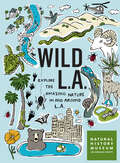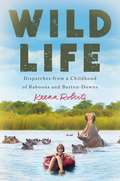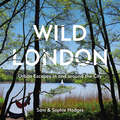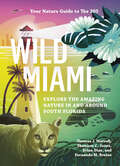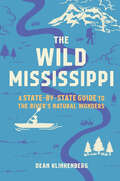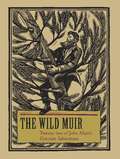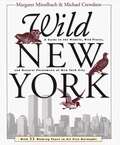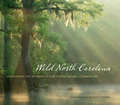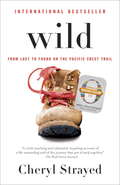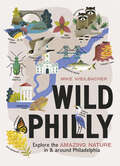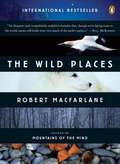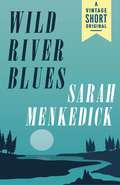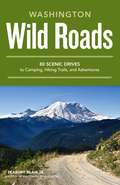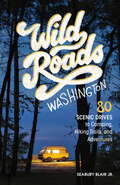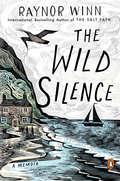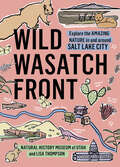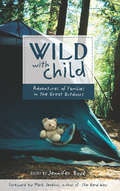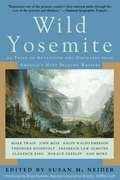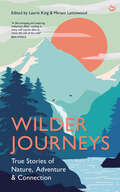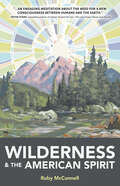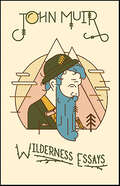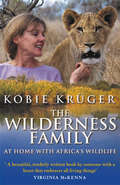- Table View
- List View
Wild LA: Explore the Amazing Nature in and Around Los Angeles
by Jason G. Goldman Natural History Museum of Los Angeles County Lila M. Higgins Gregory B. Pauly Charles Hood“Put on your hiking shoes, pack your binoculars, and rediscover the City of Angels.” —Westways Magazine Los Angeles may have a reputation as a concrete jungle, but in reality, it's full of amazing wildlife. You just need to know where to find it! Equal parts natural history, field guide, and trip planner, Wild LA has something for everyone. It looks at the factors that shape local nature—including fire, floods, and climate—and profiles over 100 local species, from easy-to-spot squirrels and praying mantids to more elusive green sea turtles, bighorn sheep, and mountain lions. Also included are descriptions of day trips that help you explore natural wonders on hiking trails, in public parks, and in your own backyard.
Wild Life: Dispatches from a Childhood of Baboons and Button-Downs
by Keena RobertsDon't Let's Go to the Dogs Tonight meets Mean Girls in this funny, insightful fish-out-of-water memoir about a young girl coming of age half in a "baboon camp" in Botswana, half in a ritzy Philadelphia suburb.Keena Roberts split her adolescence between the wilds of an island camp in Botswana and the even more treacherous halls of an elite Philadelphia private school. In Africa, she slept in a tent, cooked over a campfire, and lived each day alongside the baboon colony her parents were studying. She could wield a spear as easily as a pencil, and it wasn't unusual to be chased by lions or elephants on any given day. But for the months of the year when her family lived in the United States, this brave kid from the bush was cowed by the far more treacherous landscape of the preppy, private school social hierarchy.Most girls Keena's age didn't spend their days changing truck tires, baking their own bread, or running from elephants as they tried to do their schoolwork. They also didn't carve bird whistles from palm nuts or nearly knock themselves unconscious trying to make homemade palm wine. But Keena's parents were famous primatologists who shuttled her and her sister between Philadelphia and Botswana every six months. Dreamer, reader, and adventurer, she was always far more comfortable avoiding lions and hippopotamuses than she was dealing with spoiled middle-school field hockey players. In Keena's funny, tender memoir, Wild Life, Africa bleeds into America and vice versa, each culture amplifying the other. By turns heartbreaking and hilarious, Wild Life is ultimately the story of a daring but sensitive young girl desperately trying to figure out if there's any place where she truly fits in.
Wild London: Urban Escapes in and around the City
by Sam Hodges Sophie HodgesFrom the authors of London for Lovers, this is an inspiring and comprehensive guide to London’s wild side. From exploring secret gardens, parks, farmers markets and city farms, to discovering the best spots for urban bee-keeping, foraging, open-air swimming and mudlarking, Wild London is packed with ideas for how to make the most of London’s hidden natural wonder. Separated by season, and filled with stunning photographs, this is a must-have, practical and eye-opening guide to alternative London for city-dwellers and visitors alike.
Wild Miami: Explore the Amazing Nature in and Around South Florida
by TJ Morrell Shannon Jones Brian Diaz Fernando BretosA vibrant, family-friendly guide to the unexpected nature found in and around Miami. Miami may be a bustling city with a vibrant nightlife, but its wildlife is just as wild, if you know where to look. Wild Miami reveals the amazing ecology of this tropical metropolis. Equal parts natural history, field guide, and trip planner, Wild Miami has something for everyone. This handy yet extensive guide looks at the factors that shape local nature and profiles over 100 local species, from beautiful flowers and towering palm trees to manatees and green treefrogs, spotted sunfish, and great blue heron. Also included are descriptions of day trips that help you explore natural wonders on hiking trails and beaches, in public parks, and in your own backyard.
The Wild Mississippi: A State-by-State Guide to the River's Natural Wonders
by Dean KlinkenbergDiscover the amazing flora and fauna of the Mississippi River—and the best ways to explore it, state by state! Did you know that one-quarter of all North American fish species are native to the Mississippi? Or that it shelters 300 species of birds during seasonal migrations? The Mississippi River runs through the heart of the nation, shaping its history and identity. But few of us understand its essences. It&’s a life-giving force that sustains thriving ecosystems across wetlands, prairies, and bluffs. In The Wild Mississippi, Dean Klinkenberg not only shares the wonders of the river, but he also shows you where to experience them firsthand. Pick up this must-read guide and get ready to experience the river wild! You&’ll discover: Hiking, biking, and paddling spots More than 160 parks, forests, and wildlife refuges Natural history museums and aquariums Excursions from Minneapolis, St. Louis, Memphis, New Orleans, and more
The Wild Muir
by Lee StetsonHere is an entertaining collection of John Muir's most exciting adventures, representing some of his finest writing. From the famous avalanche ride off the rim of Yosemite Valley to his night spent weathering a windstorm at the top of a tree to death-defying falls on Alaskan glaciers, the renowned outdoorsman's exploits are related in passages that are by turns exhilarating, unnerving, dizzying, and outrageous.
Wild New York: A Guide to the Wildlife, Wild Places, and Natural Phenomenon of New York City
by Michael Crewdson Margaret MittelbachBreathing new life into the city, Wild New York takes a completely fresh look at the ultimate metropolis. This beautifully illustrated and deftly written natural history uncovers the surprising range of wildlife and natural phenomena that not only survive but flourish within the unlikely confines of New York City--from the bedrock supporting Manhattan's skyscrapers to the hundreds of different animals that dwell, unsuspected, in the city's waterways and parks. Complete with handy maps and detailed excursions throughout the five boroughs, Wild New York is also an indispensable guidebook for the urban explorer. With directions for 33 walking tours, the book encourages readers to explore the city's hidden and not-so-hidden natural corners and to experience the diversity of wildlife inhabiting the city--including peregrine falcons nesting above Grand Central Station, snapping turtles lurking in Central Park's ponds, and jackrabbits living beside the runways at John F. Kennedy Airport.
Wild North Carolina Discovering The Wonders of Our State's Natural Communities
by David Blevins Michael P. SchafaleCelebrating the beauty, diversity, and significance of the state's natural landscapes,Wild North Carolinaprovides an engaging, beautifully illustrated introduction to North Carolina's interconnected webs of plant and animal life. From dunes and marshes to high mountain crags, through forests, swamps, savannas, ponds, pocosins, and flatrocks, David Blevins and Michael Schafale reveal in words and photographs natural patterns of the landscape that will help readers see familiar places in a new way and new places with a sense of familiarity. Wild North Carolinaintroduces the full range of the state's diverse natural communities, each brought to life with compelling accounts of their significance and meaning, arresting photographs featuring broad vistas and close-ups, and details on where to go to experience them first hand. Blevins and Schafale provide nature enthusiasts of all levels with the insights they need to value the state's natural diversity, highlighting the reasons plants and animals are found where they are, as well as the challenges of conserving these special places.
Wild (Oprah's Book Club 2.0 Digital Edition): From Lost to Found on the Pacific Crest Trail
by Cheryl StrayedOprah's Book Club 2.0 selection: This special eBook edition of Cheryl Strayed's national best seller, Wild, features exclusive content, including Oprah's personal notes highlighted within the text, and a reading group guide. A powerful, blazingly honest memoir: the story of an eleven-hundred-mile solo hike that broke down a young woman reeling from catastrophe--and built her back up again.At twenty-two, Cheryl Strayed thought she had lost everything. In the wake of her mother's death, her family scattered and her own marriage was soon destroyed. Four years later, with nothing more to lose, she made the most impulsive decision of her life: to hike the Pacific Crest Trail from the Mojave Desert through California and Oregon to Washington State--and to do it alone. She had no experience as a long-distance hiker, and the trail was little more than "an idea, vague and outlandish and full of promise." But it was a promise of piecing back together a life that had come undone.Strayed faces down rattlesnakes and black bears, intense heat and record snowfalls, and both the beauty and loneliness of the trail. Told with great suspense and style, sparkling with warmth and humor, Wild vividly captures the terrors and pleasures of one young woman forging ahead against all odds on a journey that maddened, strengthened, and ultimately healed her.
Wild Philly: Explore the Amazing Nature in and Around Philadelphia (Wild Ser.)
by Mike WeilbacherA vibrant, family-friendly guide to the unexpected nature found in and around Philadelphia. Philadelphia may seem like a concrete jungle, but in reality, it's full of amazing wildlife. You just need to know where to find it! Equal parts natural history, field guide, and trip planner, Wild Philly has something for everyone. This handy yet extensive guide looks at the factors that shape local nature and profiles over 100 local species, from beautiful flowers and towering trees to majestic birds and surprising city-dwellers like coyotes and red foxes. Also included are descriptions of day trips that help you explore natural wonders on hiking trails, in public parks, and in your own backyard.
The Wild Places
by Robert Macfarlane?An eloquent (and compulsively readable) reminder that, though we?re laying waste the world, nature still holds sway over much of the earth?s surface.? ?Bill McKibben Are there any genuinely wild places left in Britain and Ireland? That is the question that Robert Macfarlane poses to himself as he embarks on a series of breathtaking journeys through some of the archipelago?s most remarkable landscapes. He climbs, walks, and swims by day and spends his nights sleeping on cliff-tops and in ancient meadows and wildwoods. With elegance and passion he entwines history, memory, and landscape in a bewitching evocation of wildness and its vital importance. A unique travelogue that will intrigue readers of natural history and adventure, The Wild Places solidifies Macfarlane?s reputation as a young writer to watch.
The Wild Places
by Robert MacfarlaneAre there any genuinely wild places left in Britain and Ireland? Or have we tarmacked, farmed and built ourselves out of wildness? In The Wild Places, Macfarlane embarks on a series of journeys in search of the wildness that remains in these islands. His journeys take him through some of the most remarkable landscapes of our archipelago. He climbs, walks and swims through these places in rainstorm, sunlight and blizzard, by darkness and by day, and in all seasons. He spends nights sleeping out on cliff-tops and remote beaches, deep in snowy woods, on pilgrim islands, mountain summits, and ancient meadows. He bathes in phosphorescent seas, walks frozen rivers at night, and watches a red sun rise over an Arctic England. In the course of his journeys, Macfarlane's own understanding of wildness undergoes a transformation.
Wild River Blues
by Sarah MenkedickIn her early thirties and an aspiring literary journalist, Sarah Menkedick joins her baby brother Jackson and his precious Honda, the ”Jackwagon,” for fourteen transformative days on an east-coast backpacking adventure. The two cross mountains and by the end—exhausted to the core and unshowered—they reflect on the trajectory of their lives, the music they make and listen to, the principles to which they strive, and the disillusionment one can encounter after years of doggedly pursuing a passion. With only each other for company, they escape the trappings of their material lives. Together, they learn to heal, to love, and finally—to listen to one another. A Vintage Shorts Original. A ebook short.
Wild Roads Washington: 80 Scenic Drives to Camping, Hiking Trails, and Adventures
by Seabury BlairThis choose-your-own-adventure guidebook is the first of its kind to take take the easy hike offroading--and up forest roads into the lush landscape of Washington State. Most forest roads in Washington climb almost as high as some of the trails, providing vistas almost as good as those reached by foot. Featuring 75 roads throughout the state, the author outlines hikes off of each route, whether you want to start by foot at the bottom or closer to the peak. Some of these roads are paved and designated Forest Highways, while others are rough, single-lane routes where wildlife and scenery outnumber vehicles.
Wild Roads Washington, 2nd Edition : 80 Scenic Drives to Camping, Hiking Trails, and Adventures
by Seabury BlairWhether you love living on the road or are just fighting the Sunday scaries, discover the 80 best scenic drives to camping, trails, and adventures in Washington!Now fully updated with 5 new roads, Wild Roads Washington is perfect for roadtripping enthusiasts, RV-ers, and #vanlifers looking to explore the best vistas the state has to offer.Experience some serious road rave with drives that take you to the most beautiful places in Washington State, such as:Views of Mount Rainier at the end of the road to Sun Top Vistas of Lake Cushman and Hoot Canal from atop Mount Ellinor in the OlympicsPicnics amid alpine scenery at Salmon Meadows in the Okanogan National ForestThe 80 routes span the state from eastern Washington to the Olympics and the coast and are on paved and dirt roads that are all traversable by car, and take you to excellent trailheads for further adventure by foot! Rating by distance, road condition, and grade from Flatlanders Welcome to Valium Prescribed makes this guide flexible to your capability. Wild Roads Washington invites you to connect with nature again—all from the comfort of your vehicle.
The Wild Silence: A Memoir
by Raynor WinnAN INTERNATIONAL BESTSELLERThe incredible follow-up to the international bestseller The Salt Path, a story of finding your way back home.Nature holds the answers for Raynor and her husband Moth. After walking 630 homeless miles along The Salt Path, living on the windswept and wild English coastline; the cliffs, the sky and the chalky earth now feel like their home. Moth has a terminal diagnosis, but together on the wild coastal path, with their feet firmly rooted outdoors, they discover that anything is possible.Now, life beyond The Salt Path awaits and they come back to four walls, but the sense of home is illusive and returning to normality is proving difficult - until an incredible gesture by someone who reads their story changes everything. A chance to breathe life back into a beautiful farmhouse nestled deep in the Cornish hills; rewilding the land and returning nature to its hedgerows becomes their saving grace and their new path to follow. The Wild Silence is a story of hope triumphing over despair, of lifelong love prevailing over everything. It is a luminous account of the human spirit's connection to nature, and how vital it is for us all.
Wild Together: My Adventures With Loki The Wolfdog
by Kelly LundFor all lovers of dogs and adventure, come experience Kelly and Loki the Wolfdog’s world together, as they explore the country and inspire those around them, revealing the endless possibilities between a man and his four-legged companion. During a blizzard in 2012, Kelly brought Loki—a husky/arctic wolf/malamute mix—home. Growing up in a family that took dog ownership very seriously, Kelly had his fair share of experiences with large dogs. But Loki was different. Instead of the dog entering into Kelly’s world, Kelly felt that he had to listen closely to Loki and enter into his world. At that time, Kelly decided that he would do everything possible to not leave him behind at the house. They started backcountry snowboarding together when Loki was four months old, and before his third birthday, he’d seen most of the western United States. Loki the Wolfdog has developed a massive following across social media. With 1.5 million followers on Instagram and 140,000 likes on Facebook, people have grown to love following Kelly and Loki’s adventures. Starting out just for fun, Kelly started an Instagram account for Loki documenting their escapades. The story was later picked up by numerous websites, giving them unexpected exposure. Realizing that they now have a voice in the social media community, they want to give back and inspire others to get out, explore the world, and make memories with their pups. Loki the Wolfdog has a massive following, because people have enjoyed watching Kelly and Loki’s undeniable bond. The story is both philosophical and visual: an invitation to experience life through Kelly and Loki’s eyes.
Wild Wasatch Front: Explore the Amazing Nature in and around Salt Lake City (Wild Series)
by Natural History Museum of UtahA vibrant, informative guide to the unexpected nature in Salt Lake City and the surrounding area. Set out on a field trip with the experts from the Natural History Museum of Utah. In this book, you&’ll learn about over 100 local species, both plants and animals. Be on the lookout for painted turtles in Ogden, spot pelicans soaring over Provo, and identify pavement mushrooms in Salt Lake City. Equal parts field guide and trip planner, Wild Wasatch Front reveals the unexpected nature thriving in parks, beside urban streams, along local trails… and maybe even in your own backyard.
Wild with Child
by Mark Jenkins Jennifer BoveWild with Child is a unique collection of true stories by parents who boldly head out into the wilderness with kids in tow (or in the lead, as the case may be). These stories run the gamut of adventure: winter camping, climbing, spelunking, field research, skiing, llama trekking, fishing, hunting, and searching for pirate treasure with children of all ages. Readers should bundle up before they strike out into the Rocky Mountains with Mark Jenkins, whose idea of quality time with the kids is camping in a snow cave. Leslie Leyland-Fields shares deep gratitude as her brood safely migrates to an Alaskan island by bush plane. Maleesha Speer confides her personal evolution as she awakens to the wonder of her unborn child in bear country. Whether just beginning the course of wild parenting or looking back at the trail they've taken, these writers aren't willing to accept Disneyland as the final frontier. Even the most civilized among them insist that their children grow up feeling grass between their toes and sun on their skin. It's a healthy heritage, giving kids a steady set of bearings, making them strong, and helping them rise to challenges.
Wild Yosemite: 25 Tales of Adventure and Discovery from America's Most Beloved Writers
by Susan M. NeiderAn ideal gift for lovers of nature. This beautiful literary collection explores the spectacular natural features of Yosemite through the eyes of some of America’s most notable and extraordinarily talented writers. In 1851, Lafayette Bunnell chronicled his travels with the Mariposa Battalion, the first non-natives to visit Yosemite Valley. Following in his footsteps, Theodore Roosevelt, Ralph Waldo Emerson, Mark Twain, Clarence King, Frederick Law Olmsted, Joaquin Miller, and Horace Greeley made their pilgrimages and were moved to recount their observations. Included here as well is the work of John Muir, founder of the Sierra Club, whose love for Yosemite led to the establishment of Yosemite National Park in 1890. This lyrical book is a literary tribute to Yosemite’s gorgeous landscape. A great companion for those who love to travel and revel in the unique natural beauty of the great American West, Wild Yosemite will transport you in spirit to the heart of the Sierra Nevadas, where you’ll experience the canyons, the cliffs, the pines, the mountain air, and the panoramic grandeur of Yosemite National Park.
Wilder Journeys: True Stories of Nature, Adventure and Connection
by Laurie King & Miriam LancewoodEnvironmental writer Laurie King and internationally bestselling author Miriam Lancewood present a collection of narrative non-fiction stories and poems on the human connection with nature.Follow the call of the wild with these incredible true stories from an international group of nature lovers, nomads and adventurers.In these pages, you are invited to share the wisdom they gained on their wild journeys. You will walk across the Australian desert with American explorer Angela Maxwell; live with Hamza Yassin and a family of eagles in Scotland; survive for 10 years in an Australian forest with Gregory Smith; hunt in the wilderness with Miriam Lancewood in New Zealand; chart Karl Bushby's passage through the formidable Darien Gap; and set up a surf school for people of colour in California with David Malana.With beautiful illustrations, a foreword from explorer Belinda Kirk and contributions from leading poets, including David Whyte and Fatimah Asghar, this book will inspire you to get out of your comfort zone and connect to your wild, animal soul.
Wilderness and the American Spirit
by Ruby McConnellTHE IDEA OF THE AMERICAN SPIRIT has always been rooted inexpansion and abundance— at great cost to the environment. Withthe world burning up, one can' t help but wonder: how did we gethere? Wilderness and the American Spirit traces hundreds ofyears of The United States' relationship to the environment starting fromthe initial colonization of Native American land, to the developmentof land use policies, and the creation of resource based economies.Using a lesser known alternative to the Oregon Trail— Ruby McConnelluses the Applegate Trail as a vehicle to weave exposition, history, andscience to show us how we got to where we are now and what wecan do about it.
Wilderness Essays
by John MuirThis series celebrates the tradition of literary naturalists—writers who embrace the natural world as the setting for some of our most euphoric and serious experiences. These books map the intimate connections between the human and the natural world. Literary naturalists transcend political boundaries, social concerns, and historical milieus; they speak for what Henry Beston called the “other nations” of the planet. Their message acquires more weight and urgency as wild places become increasingly scarce.
The Wilderness Family
by Kobie KrugerWhen Kobie Krüger, her game-ranger husband and their three young daughters moved to one of the most isolated corners of the world - a remote ranger station in the Mahlangeni region of South Africa's vast Kruger National Park - she might have worried that she would become engulfed with loneliness and boredom. Yet, for Kobie and her family, the seventeen years spent in this spectacularly beautiful park proved to be the most magical - and occasionally the most hair-raising - of their lives.Kobie recounts their enchanting adventures and extraordinary experiences in this vast reserve - a place where, bathed in golden sunlight, hippos basked in the glittering waters of the Letaba River, storks and herons perched along the shoreline, and fruit bats hung in the sausage trees.But as the Krugers settled in, they discovered that not all was peace and harmony. They soon became accustomed to living with the unexpected: the sneaky hyenas who stole blankets and cooking pots, the sinister-looking pythons that slithered into the house, and the usually placid elephants who grew foul-tempered in the violent heat of the summer. And one terrible day, a lion attacked Kobus in the bush and nearly killed him.Yet nothing prepared the Krugers for their greatest adventure of all, the raising of an orphaned prince, a lion cub who, when they found him, was only a few days old and on the verge of death. Reared on a cocktail of love and bottles of fat-enriched milk, Leo soon became an affectionate, rambunctious and adored member of the fmaily. It is the rearing of this young king, and the hilarious endeavours to teach him to become a 'real' lion who could survive with his own kind in the wild, that lie at the heart of this endearing memoir. It is a memoir of a magical place and time that can never be recaptured.
